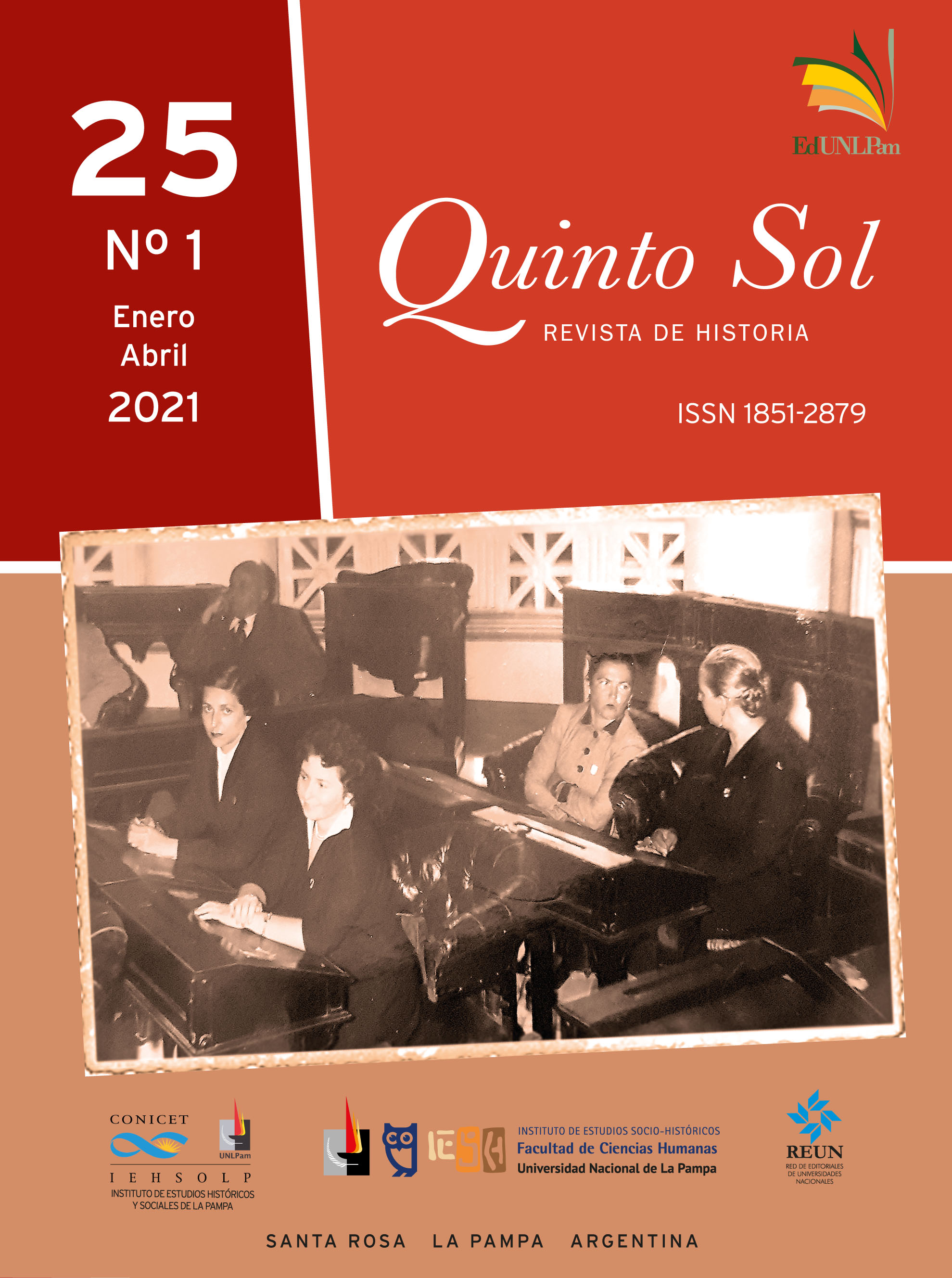A Guerra Fria e a intervenção norte-americana em Malvinas (1982)
DOI:
https://doi.org/10.19137/qs.v25i1.4179Palavras-chave:
ditadura militar, Guerra das Malvinas, relações internacionais, Guerra friaResumo
Este artigo analisa a guerra das Malvinas desde uma perspectiva global, compreendendo o rumo que teve como entrelaçado com o contexto internacional da Guerra Fria. Por isso, centra-se o foco na análise da política norte-americana, primeiro diplomática e depois intervencionista como aliada de Grã-Bretanha. Ao analisar as conversações bilaterais entre Margaret Thatcher e Ronald Reagan, junto com comunicados oficiais e publicações de diferentes agencias estatais norte americanas, observou-se a forma em que o desenvolvimento da contenda, para além das particularidades regionais que a desencadearam, esteve inserto na lógica antissoviética da segunda Guerra Fria. A isto, soma-se um contexto global de imposição de políticas neoliberais que radicalizaram a intervenção norte-americana a favor da imposição de seu modelo imperialista capitalista.Downloads
Referências
Armony, A. (1999). La Argentina, los Estados Unidos y la cruzada anticomunista en América Central, 1977-1984. Universidad Nacional de Quilmes.
Balerini Casal, E. (2018). La asesoría militar argentina en Honduras. Diálogos Revista Electrónica de Historia, 19 (2), 177-210. https://doi.org/10.15517/dre.v19i2.31144
Bicheno, H. (2007). Razor´s Edge: The Unofficial History of the Falklands War. Orion Books.
Bluth, C. (1992). Anglo-American Relations and the Falklands Conflict. En A. Danchev (Ed.) International Perspectives on the Falklands Conflict (pp. 203-223). St. Martin´s Press. https://doi.org/10.1007/978-1-349-21932-2_11
Bosoer, F. (2008). Malvinas, capítulo final (II). Capital Intelectual. https://www.academia.edu/3301986/FABI%C3%81N_BOSOER._MALVINAS_CAP%C3%8DTULO_FINAL_I_Y_II_._GUERRA_Y_DIPLOMACIA_EN_LA_ARGENTINA_1942-1982_
Brecher, M. (1996). Crisis, Conflict, War: State of the Discipline. International Political Science Review, 17 (2), 127-139. https://doi.org/10.1177/019251296017002001
Conrad, S. (2016). What Is Global History? Princeton University Press.
Costa-Méndez, N. (1993). Malvinas. Esta es la historia. Sudamericana.
Erlich, U. (2020). Malvinas, soberanía e integración regional. En D. Filmus (Comp.) Malvinas una causa regional justa (pp. 91- 102). Consejo Latinoamericano de Ciencias Sociales.
Escudero, L. (1996). Malvinas: el gran relato. Gedisa.
Freedman, L. (2005). The Official History of the Falklands Campaign. Routledge.
Freedman, L. y Gamba-Stonehouse, V. (1991). Signals of War: The Falklands Conflict of 1982. Princeton University Press.
Fernández, S. (2018). La historia regional y local y las escalas de investigación. Un contrapunto para pensar sobre desafíos historiográficos, Quinto Sol. Revista de Historia, 22 (3), 13-20. https://dx.doi.org/10.19137/qs.v22i3.3337
Friedman, M. (2002). Capitalism and Freedom. University of Chicago Press.
Gaddis, J. L. (2005). La Guerra Fría. RBA Libros.
García Ferreira, R. (2013). El derrocamiento de Jacobo Árbenz y la Guerra Fría en América Latina. Nuevas fuentes y perspectivas. Revista de Historia de América, 149, 39-43.
Haig, A. (1984). Memorias. Atlántida.
Harmer, T. (2014). The Cold War in Latin America. En A. M. Kalinovsky y C. Daigle (Eds.) The Routledge Handbook of the Cold War (pp. 133-148). Routledge Handbooks Online. https://doi.org/10.4324/9781315882284
Hill, K. y Hill, G. (2004). Encyclopedia of Federal Agencies and Commissions. Facts On File.
Lorenz, F. (2014). Todo lo que necesitás saber sobre Malvinas. Paidós.
Novaro, M. y Palermo, V. (2003). La dictadura militar, 1976-1983: del golpe de Estado a la restauración democrática. Paidós.
Palermo, V. (2007). Sal en las heridas. Las Malvinas en la cultura argentina contemporánea. Sudamericana.
Pozzi, P. (2009). Estados Unidos y los orígenes de la Guerra Fría. En F. Nigra y P. Pozzi (Comps.) Invasiones bárbaras en la historia contemporánea de los Estados Unidos (pp. 263-265). Maipue.
Puig, J. C. (1983). Malvinas y el régimen internacional. Depalma.
Downloads
Publicado
Edição
Seção
Licença
Al momento de enviar sus contribuciones, los colaboradores deberán declarar que poseen el permiso del archivo o repositorio donde se obtuvieron los documentos que se anexan al trabajo, cualquiera sea su formato (manuscritos inéditos, imágenes, archivos audiovisuales, etc.), permiso que los autoriza a publicarlos y reproducirlos, liberando a la revista y sus editores de toda responsabilidad o reclamo de terceros.
Asimismo, los autores deben adherir a la licencia Creative Commons denominada “Atribución - No Comercial CC BY-NC-SA”, mediante la cual el autor permite copiar, reproducir, distribuir, comunicar públicamente la obra y generar obras derivadas, siempre y cuando se cite y reconozca al autor original. No se permite, sin embargo, utilizar la obra con fines comerciales. Los autores podrán establecer acuerdos adicionales para la distribución no exclusiva de la versión de la obra publicada en la revista (por ejemplo, situarlo en un repositorio institucional o publicarlo en un libro), con el reconocimiento de haber sido publicado primero en esta revista.
La publicación de contenidos en esta revista no implica regalía ni cargo alguno para los/as contribuyentes.
Quinto Sol adhiere adhiere a DORA (Declaration on Research Assessment) firmada en San Francisco, California, el 16 de diciembre de 2012, y a la Declaración de México (Declaración Conjunta LATINDEX - REDALYC - CLACSO - IBICT).










4.png)
2.png)












_(2).png)


2.jpg)



1.jpg)





